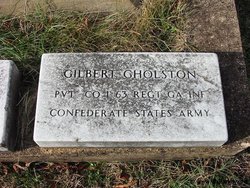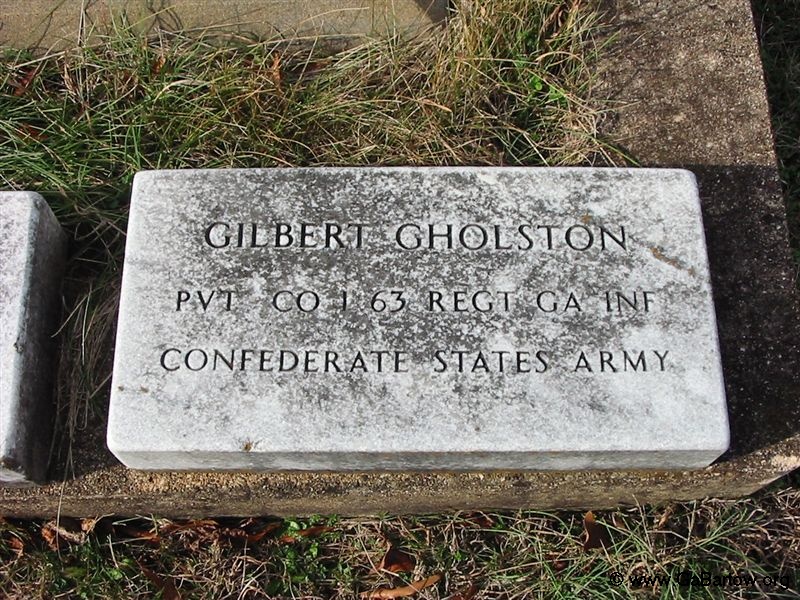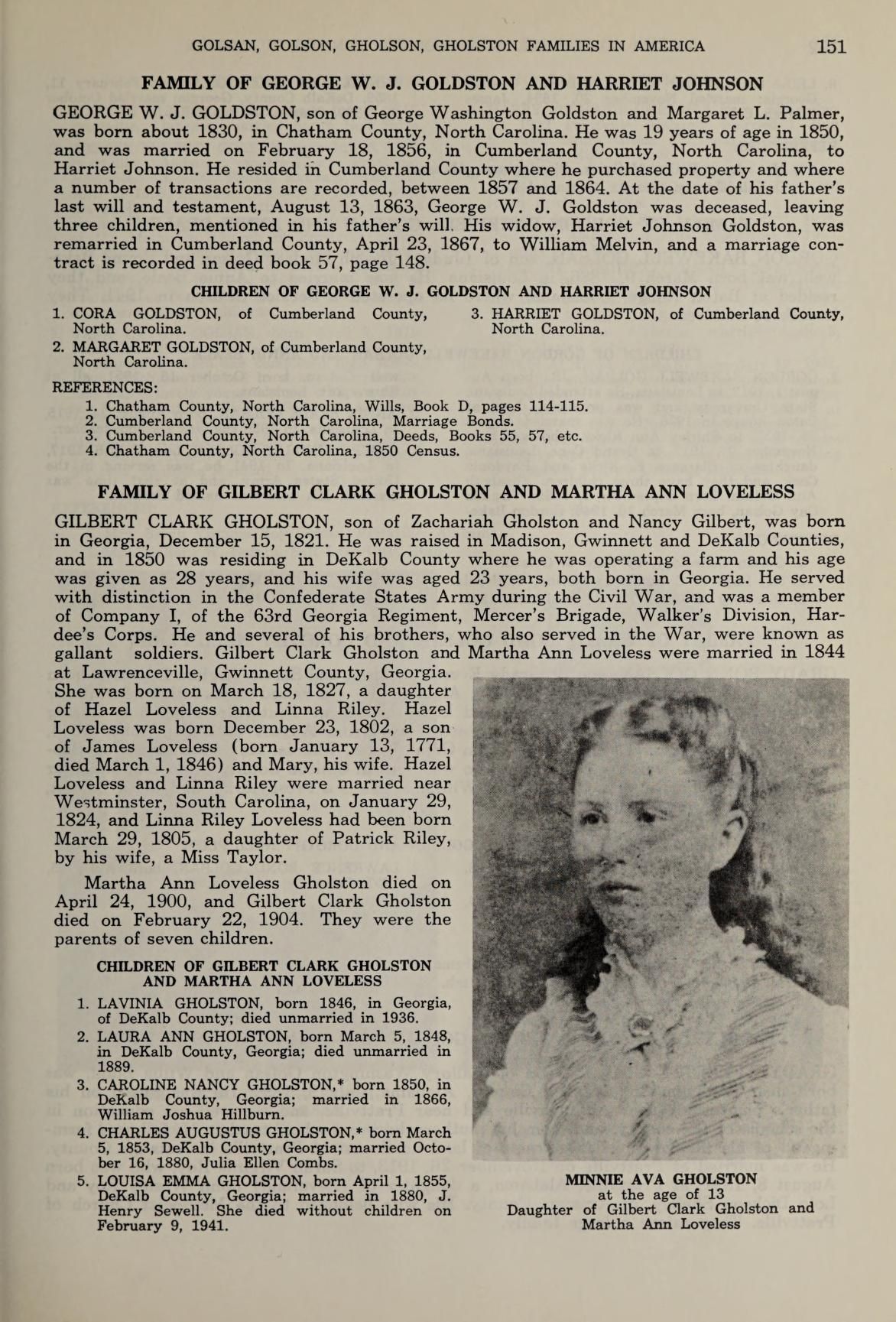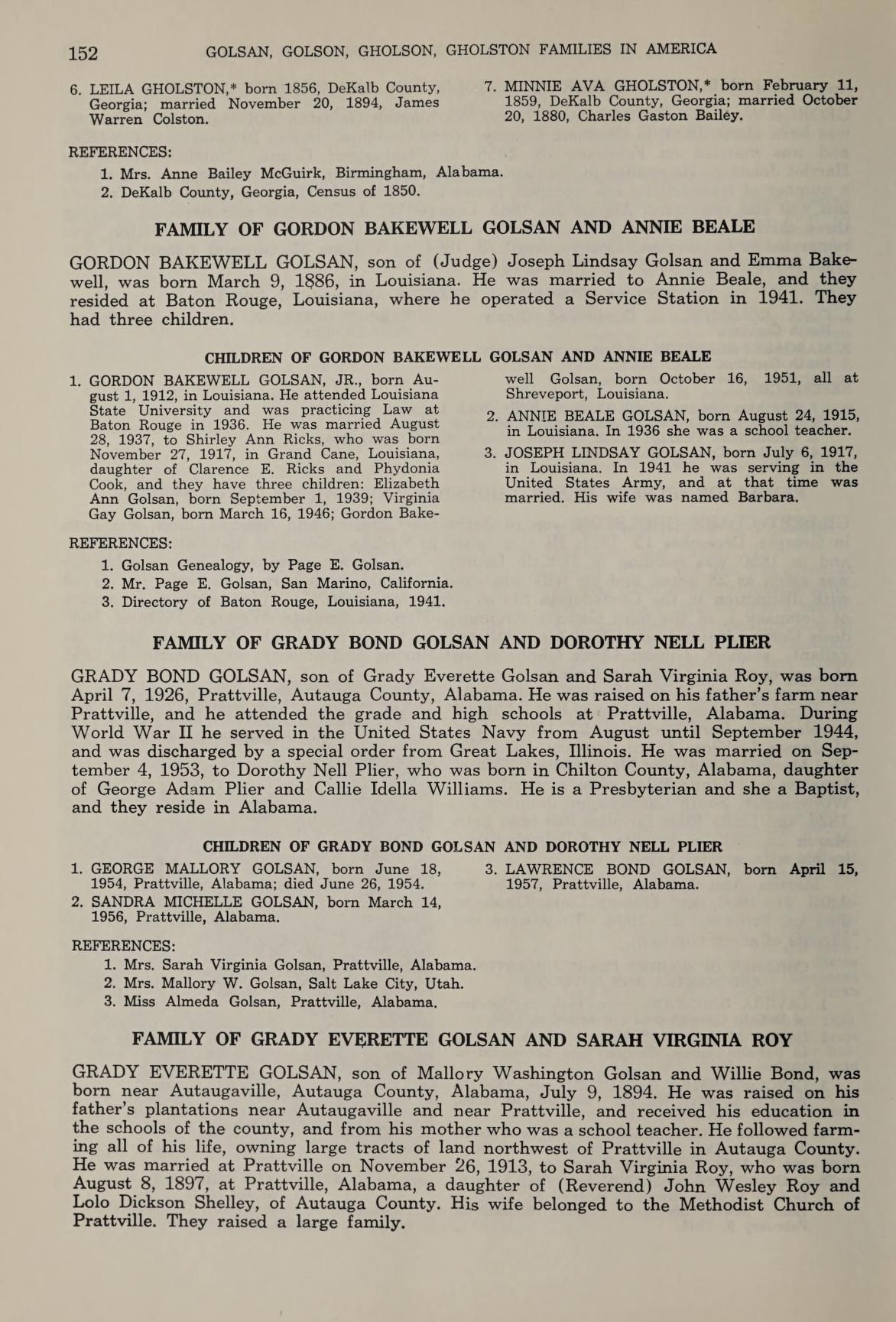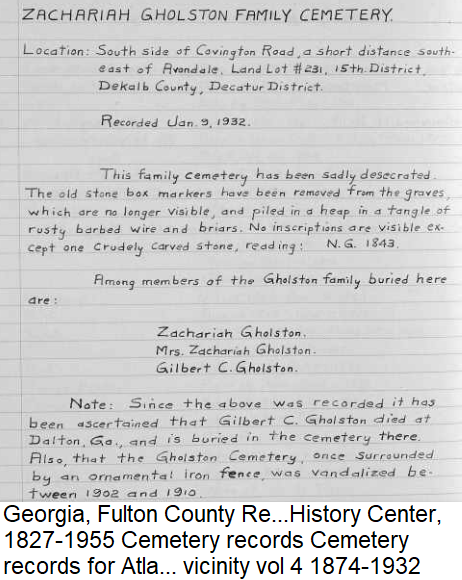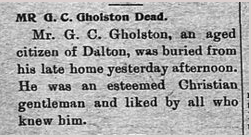____________________________________________________________
Gilbert Clark Gholston, b. 15 Dec 1821, in Madison Co., GA, the son of Capt. Zachariah Gholston and Nancy Gilbert, for whom Gilbert Gholston was named. The mother was a direct descendant of Sir Humphrey Gilbert, 1539-89, of Devon, England, an early proponent of expeditions to the New World, and half-brother to Sir Walter Raleigh.
Gill Gholston resided in DeKalb Co., GA in 1850 & was the administrator of his father's estate there in 1854. On Jan. 19, 1845 he was married to Martha Loveless. They moved, along with several family members, to Adairsville, Bartow Co., GA prior to the War for Southern Independence, where he became a successful merchant and real estate speculator. Adairsville, Ga. was a boom town during this era due to the railroads that were built through that section of Georgia.
Mr. Gholston rendered service to his country in Co. I, 63rd Georgia Infantry from January, 1863 until May 1865. The 63rd Regiment was recruited from the men of Bartow and Gordon Counties in the Fall of 1862. The Regiment was mustered in at Thunderbolt Battery, near Savannah, Ga. on Dec. 23, 1862.
Pvt. Gholston served with the Regiment at numerous outposts surrounding Savannah, including Rose Dew Island, was deployed to Battery Wagner, SC during the assault on that installation made famous by the recent movie "Glory", and served in the ill-fated Atlanta and Nashville Campaigns under Gen.s Johnston and Hood. Pvt. Gholston's application for pension in 1896 stated that he surrendered at Kingston, Ga. in May 1865. He apparently did not accompany the Regiment to Smithfield, NC for unknown reasons, likely sickness or wounds.
Gill Gholston and Martha Loveless had the following children:
1. LAVINIA GHOLSTON, b. 1846.
2. LAURA ANN GHOLSTON, b. March 05, 1848.
3. CAROLINE NANCY GHOLSTON, b. 1850, DeKalb Co, GA; d. April 1877.
4. CHARLES AUGUSTUS GHOLSTON, b. March 05, 1853.
5. LOUISA EMMA GHOLSTON, b. April 01, 1855.
6. LEILA GHOLSTON, b. 1856; d.c. 1959.
7. MINNIE AVA GHOLSTON, b. February 11, 1859.
Martha Loveless Gholston was born March 18, 1827 in DeKalb Co., Ga. and died April 24, 1900 in Dalton, Whitfield Co., Ga. Several of the Gholston and Loveless families intermarried during this generation.
Mr. Gholston spent most of his life as a merchant in Adairsville, Bartow Co., Ga. and was actively involved in church and civic affairs. He was the administrator of the estate of his brother, Isaac Gholston, in 1874, Bartow Co., Ga.
Sometime late in life, he retired from the mercantile profession to a gentleman's farm in the mountains near Dalton, Ga. In 1896, he applied for a pension for his Confederate service. In the pension he stated his health was poor due to arthritis and kidney disease.
His wife, Martha, died 24 Apr 1900 at the farm near Dalton, Ga. Mr. Gholston moved back to Bartow Co., Ga. to be near family in his twilight years. He passed away there in 1904 and is buried in the Confederate Section of East View Cemetery at Adairsville, Ga.
____________________________________________________________
Collected Interviews, Vol. III, Kennesaw College Oral History Project. Excerpt of interview with Alice B. Howard:
"Was there anyone in your growing up years that really had a profound influence on you?"
"My grandmother Reed (Nancy Josephine Gholston, wife of George Oliver Reed) was the greatest influence in my life because I was with her constantly until I was 17 years old, when she died. She read to me when I was little from my gift books and from her favorite portions of the Bible -the Psalms. She often retold me the stories of Civil War incidents in which she had a part. She told about her former slaves, Jim and Emma Gholston, who refused to leave her. They never abandoned her and returned to look after her and help in any way they could. I loved to listen to the old soldiers who came occasionally to sit on the front porch steps while she sat in her rocking chair, recalling the stark events of the War. Many of the women and children refugeed to various points in South Georgia when they heard that Sherman was heading toward Atlanta with his horde of looters. I remember she said that she and her sister, Aunt Elizabeth Gholston (Mrs. James Loveless), had resolved to remain, no matter what, to protect their homes. Their neighbor on the hill across the road, Mrs. Bowdoin, also stayed. Her husband was with the Army at Kingston as a surgeon and physician to the wounded and ill Confederate soldiers. But, those women were helpless to protect their possessions. The soldiers looted my grandmother's house of everything they could carry off. My grandmother lived right in the center of Adairsville, just across the street from some of the stores. Her house was the only brick house there at the time. I should give you a little background on how she came to be in Adairsville. She was born and reared in DeKalb County, the daughter of Zachariah Gholston and Nancy Gilbert. She was one of nine children. Zachariah Gholston was a prominent landowner. He represented Madison County in the Georgia Assembly from 1820 to 1826 and represented Gwinnett County from 1830 to 1834. His 3,000 acre plantation is now incorporated as the city of Avondale. When Zachariah died in 1854, the estate was sold and the proceeds divided among the nine children. Gilbert Gholston, and his sisters Nancy and Elizabeth, came to Adairsville, which was a thriving location due to the building of the Western & Atlantic Railroad. Adairsville was the meeting point for the railroad, which was being constructed from Atlanta and Chattanooga simultaneously and scheduled to meet at the point 60 miles in each direction, which was Adairsville. The Gholstons came to invest in property in this booming town. They bought business and residential property, and Uncle Gilbert went into business on Front Street. Nancy bought several houses and lots on Main and Summer Streets. Uncle Gil served in Company I of the 63rd Georgia Regiment in the War, and married Martha Ann Loveless, Elizabeth married James Loveless and Nancy married Ebenezer Loveless - brothers and sister in the same Loveless family."
____________________________________________________________
Gill Gholston's Christmas, 1864:
[Extract from Under the Stars and Bars, by Walter A. Clark, 63rd Georgia Regiment, CSA]
A Christmas Day With Forrest
It was the winter of '64 and to those of us who wore the grey, it was likewise the "winter of our discontent." The hopes of the Confederacy were on the wane. The clouds above it had no silver lining, free or otherwise. Sherman was "marching through Georgia," leaving in his wake the ashes of many a Southern home. Hood's reckless raid on Nashville had ended in disaster and his ragged battalions were making tracks for the Tennessee River, some of them barefeet, at a quickstep known to the Confederate tacticians as "double distance on half rations."
The [63rd] had fortunately escaped the butchery at Franklin against which Forrest had so strongly protested. As this immunity was due to our having been detained with Smith's Brigade to ferry a salt train across the Tennessee River, salt had literally "saved our bacon."
After rejoining the Army, we had been again detached to operate under Gen. Forrest near Murfreesboro and, in this way, had missed the rout at Nashville. Aside from these immunities, the campaign had been one of exceptional hardships. The weather was bitterly cold and our wardrobes were sparse. The writer wore a thread bare thin fatigue jacket, with no overcoat and slept under a single blanket with the thermometer at nine degrees above zero. For a week prior to the retreat, we had been engaged in the pleasant pastime of handling, with ungloved hands, railroad ties and rails encased in sleet and snow. And yet I can not recall a single complaint. It is my deliberate conviction, based upon this and similar evidence, that the Confederate soldier fought harder on shorter rations and grumbled less under greater privations than any soldier in history.
The battle of Nashville began on the morning of Dec. 15th, and for two days, thirty miles away, we listened to the thunder of artillery and anxiously awaited the issue.
At 1 a.m. Dec. 17th, we were aroused to begin the longest, hardest forced march of our four years' service. Columbia, the point of junction with Hood's retreating Army, is sixty miles away and we have to make it in forty-eight hours or risk almost certain capture by a force ten times our own. It is cold, dark and raining - a dreary combination. The roads are a mass of mud. For twenty one hours we plow wearily ahead before being given a brief rest. We are up again on the march with slower step. I breakfast on an ear of corn picked up from a roadside field, smearing it with black grease from the bottom of my fry pan.
On reaching Columbia, we are assigned rear guard under Forrest and Walthall, who are instructed by Hood to sacrifice every man if necessary to ensure the safety of the retreating Army on the Pike moving south towards the Tennessee River.
Manning trenches half filled with snow and holding the enemy in check for a few days so as to give Hood a fair start in the race, we begin our retreat from this point on Dec. 22nd, and on Christmas eve wound up near Pulaski, Tenn.
Coiled up in a blanket on the cold, bare ground, no visions of Santa Claus, nor hopes of a Christmas menu on the morrow brighten our dreams.
Early Christmas morn we are gathered around the camp fire awaiting orders to march. Frank Stone, tall and thin, so thin that Charlie Goetchus had advised him to always present his side view to the enemy, as a minie ball would never reach his anatomy in that position, ambles up on a horse he secured from the cavalry. Frank had manfully tried to keep up with the procession. Half sick, his shoes worn soleless, his feet lacerated and bleeding, he had marched when every step was agony, and crawled on hands and knees until human nature could endure no more.
Fortunately, one of Forrest's cavalry had a spare horse that saved him from a Northern prison and sure death. Frank had no saddle and to supply that need the boys had piled his steed with blankets to a depth of five or six inches. As he rode up, his eye fell on a lot of cooking utensils that had to be left for lack of transportation.
Turning to Will Daniels he said, "Lieutenant, hadn't I better take along some of these?" Gen. Forrest, standing a few feet away unobserved, grave and silent, now announces himself with a blistering retort to Frank's innocent question, "I think you've got a damned sight more now than you're entitled to." Frank, stunned by the General's sharp words, made no reply and that was the end of that.
The bugle sounds and we are on the march again. About midday we halt at the summit of a ridge with an old line of breastworks skirting its crest. We are told "Fall In!" The ranks are hastily formed, the trenches manned and Morton's battery is planted a short distance from us. Our Regiment is placed as support for the battery and, as we make ready, Gen. Forrest passes in front of us, in a half bent position. Reaching the trenches, he watches the advance of the enemy carefully and hurries to the rear.
In a moment we hear the clatter of horse's hooves and the "Wizard of the Saddle" dashes by at half speed, riding magnificently, his martial figure as straight as an arrow, a very God of War, yelling as he reaches the waiting ranks, "Charge!"
Over the breastworks flashes a line of grey and down the slope they sweep, the "Rebel Yell" heard at every step.
The Captain commanding our Regiment is undecided as to his duty, but finally orders us to retain our position guarding the battery. Just then, Gen. Featherston rides up,
"What Regiment is this?"
"63rd Georgia, Sir."
"What are you doing here?"
"Supporting this battery, Sir."
"Battery, the devil. Git over them breastworks and git quick."
We git.
The skirmish is soon over. The Yankees fled, leaving a piece of artillery and a number of horses in our possession. More importantly, our charge stopped the Yankee line of march, for a few hours while they sent out patrols to see if this was the entire Army or just a delaying force.
We hold our position until late in the afternoon when we are relieved by Red Jackson's cavalry. As we are filing off the enemy reappears and the cavalry carbines provide a parting echo. Night comes on and if there ever was a darker or more starless one, I can not place it. Tramping in the cold and mud, companies and regiments are comingled. No one knows where he is supposed to be. Elmore Dunbar was carrying the Regimental colors and but for his occasional whistling imitation of the bugle call, our Regiment would have been lost in the darkness.
I can not conceive how a larger share of unadulterated physical discomfort could have been compressed into that Christmas night. No Christmas has passed since that I have not thought of it, often with tears in my eyes. Of all the Christmas days that have come to me in this life, only this one stands out in gloomy prominence as utterly wanting in every element of the season's cheer and gladness.
Yet, looking backward through the mists of more than thirty years now, recalling its dangers and discomforts, its toil, weariness and hunger, I would not, if I could blot that day's record from the memory, for o'er its somber shadows fell and falls today, the light that comes to every true heart in the path of duty.
[Under the Stars and Bars or, Memories of Four Years Service with the Oglethorpes of Augusta, Georgia by Walter A. Clarke. Published by Chronicle Publishing Co., 1900.]
____________________________________________________________
____________________________________________________________
Gilbert Clark Gholston, b. 15 Dec 1821, in Madison Co., GA, the son of Capt. Zachariah Gholston and Nancy Gilbert, for whom Gilbert Gholston was named. The mother was a direct descendant of Sir Humphrey Gilbert, 1539-89, of Devon, England, an early proponent of expeditions to the New World, and half-brother to Sir Walter Raleigh.
Gill Gholston resided in DeKalb Co., GA in 1850 & was the administrator of his father's estate there in 1854. On Jan. 19, 1845 he was married to Martha Loveless. They moved, along with several family members, to Adairsville, Bartow Co., GA prior to the War for Southern Independence, where he became a successful merchant and real estate speculator. Adairsville, Ga. was a boom town during this era due to the railroads that were built through that section of Georgia.
Mr. Gholston rendered service to his country in Co. I, 63rd Georgia Infantry from January, 1863 until May 1865. The 63rd Regiment was recruited from the men of Bartow and Gordon Counties in the Fall of 1862. The Regiment was mustered in at Thunderbolt Battery, near Savannah, Ga. on Dec. 23, 1862.
Pvt. Gholston served with the Regiment at numerous outposts surrounding Savannah, including Rose Dew Island, was deployed to Battery Wagner, SC during the assault on that installation made famous by the recent movie "Glory", and served in the ill-fated Atlanta and Nashville Campaigns under Gen.s Johnston and Hood. Pvt. Gholston's application for pension in 1896 stated that he surrendered at Kingston, Ga. in May 1865. He apparently did not accompany the Regiment to Smithfield, NC for unknown reasons, likely sickness or wounds.
Gill Gholston and Martha Loveless had the following children:
1. LAVINIA GHOLSTON, b. 1846.
2. LAURA ANN GHOLSTON, b. March 05, 1848.
3. CAROLINE NANCY GHOLSTON, b. 1850, DeKalb Co, GA; d. April 1877.
4. CHARLES AUGUSTUS GHOLSTON, b. March 05, 1853.
5. LOUISA EMMA GHOLSTON, b. April 01, 1855.
6. LEILA GHOLSTON, b. 1856; d.c. 1959.
7. MINNIE AVA GHOLSTON, b. February 11, 1859.
Martha Loveless Gholston was born March 18, 1827 in DeKalb Co., Ga. and died April 24, 1900 in Dalton, Whitfield Co., Ga. Several of the Gholston and Loveless families intermarried during this generation.
Mr. Gholston spent most of his life as a merchant in Adairsville, Bartow Co., Ga. and was actively involved in church and civic affairs. He was the administrator of the estate of his brother, Isaac Gholston, in 1874, Bartow Co., Ga.
Sometime late in life, he retired from the mercantile profession to a gentleman's farm in the mountains near Dalton, Ga. In 1896, he applied for a pension for his Confederate service. In the pension he stated his health was poor due to arthritis and kidney disease.
His wife, Martha, died 24 Apr 1900 at the farm near Dalton, Ga. Mr. Gholston moved back to Bartow Co., Ga. to be near family in his twilight years. He passed away there in 1904 and is buried in the Confederate Section of East View Cemetery at Adairsville, Ga.
____________________________________________________________
Collected Interviews, Vol. III, Kennesaw College Oral History Project. Excerpt of interview with Alice B. Howard:
"Was there anyone in your growing up years that really had a profound influence on you?"
"My grandmother Reed (Nancy Josephine Gholston, wife of George Oliver Reed) was the greatest influence in my life because I was with her constantly until I was 17 years old, when she died. She read to me when I was little from my gift books and from her favorite portions of the Bible -the Psalms. She often retold me the stories of Civil War incidents in which she had a part. She told about her former slaves, Jim and Emma Gholston, who refused to leave her. They never abandoned her and returned to look after her and help in any way they could. I loved to listen to the old soldiers who came occasionally to sit on the front porch steps while she sat in her rocking chair, recalling the stark events of the War. Many of the women and children refugeed to various points in South Georgia when they heard that Sherman was heading toward Atlanta with his horde of looters. I remember she said that she and her sister, Aunt Elizabeth Gholston (Mrs. James Loveless), had resolved to remain, no matter what, to protect their homes. Their neighbor on the hill across the road, Mrs. Bowdoin, also stayed. Her husband was with the Army at Kingston as a surgeon and physician to the wounded and ill Confederate soldiers. But, those women were helpless to protect their possessions. The soldiers looted my grandmother's house of everything they could carry off. My grandmother lived right in the center of Adairsville, just across the street from some of the stores. Her house was the only brick house there at the time. I should give you a little background on how she came to be in Adairsville. She was born and reared in DeKalb County, the daughter of Zachariah Gholston and Nancy Gilbert. She was one of nine children. Zachariah Gholston was a prominent landowner. He represented Madison County in the Georgia Assembly from 1820 to 1826 and represented Gwinnett County from 1830 to 1834. His 3,000 acre plantation is now incorporated as the city of Avondale. When Zachariah died in 1854, the estate was sold and the proceeds divided among the nine children. Gilbert Gholston, and his sisters Nancy and Elizabeth, came to Adairsville, which was a thriving location due to the building of the Western & Atlantic Railroad. Adairsville was the meeting point for the railroad, which was being constructed from Atlanta and Chattanooga simultaneously and scheduled to meet at the point 60 miles in each direction, which was Adairsville. The Gholstons came to invest in property in this booming town. They bought business and residential property, and Uncle Gilbert went into business on Front Street. Nancy bought several houses and lots on Main and Summer Streets. Uncle Gil served in Company I of the 63rd Georgia Regiment in the War, and married Martha Ann Loveless, Elizabeth married James Loveless and Nancy married Ebenezer Loveless - brothers and sister in the same Loveless family."
____________________________________________________________
Gill Gholston's Christmas, 1864:
[Extract from Under the Stars and Bars, by Walter A. Clark, 63rd Georgia Regiment, CSA]
A Christmas Day With Forrest
It was the winter of '64 and to those of us who wore the grey, it was likewise the "winter of our discontent." The hopes of the Confederacy were on the wane. The clouds above it had no silver lining, free or otherwise. Sherman was "marching through Georgia," leaving in his wake the ashes of many a Southern home. Hood's reckless raid on Nashville had ended in disaster and his ragged battalions were making tracks for the Tennessee River, some of them barefeet, at a quickstep known to the Confederate tacticians as "double distance on half rations."
The [63rd] had fortunately escaped the butchery at Franklin against which Forrest had so strongly protested. As this immunity was due to our having been detained with Smith's Brigade to ferry a salt train across the Tennessee River, salt had literally "saved our bacon."
After rejoining the Army, we had been again detached to operate under Gen. Forrest near Murfreesboro and, in this way, had missed the rout at Nashville. Aside from these immunities, the campaign had been one of exceptional hardships. The weather was bitterly cold and our wardrobes were sparse. The writer wore a thread bare thin fatigue jacket, with no overcoat and slept under a single blanket with the thermometer at nine degrees above zero. For a week prior to the retreat, we had been engaged in the pleasant pastime of handling, with ungloved hands, railroad ties and rails encased in sleet and snow. And yet I can not recall a single complaint. It is my deliberate conviction, based upon this and similar evidence, that the Confederate soldier fought harder on shorter rations and grumbled less under greater privations than any soldier in history.
The battle of Nashville began on the morning of Dec. 15th, and for two days, thirty miles away, we listened to the thunder of artillery and anxiously awaited the issue.
At 1 a.m. Dec. 17th, we were aroused to begin the longest, hardest forced march of our four years' service. Columbia, the point of junction with Hood's retreating Army, is sixty miles away and we have to make it in forty-eight hours or risk almost certain capture by a force ten times our own. It is cold, dark and raining - a dreary combination. The roads are a mass of mud. For twenty one hours we plow wearily ahead before being given a brief rest. We are up again on the march with slower step. I breakfast on an ear of corn picked up from a roadside field, smearing it with black grease from the bottom of my fry pan.
On reaching Columbia, we are assigned rear guard under Forrest and Walthall, who are instructed by Hood to sacrifice every man if necessary to ensure the safety of the retreating Army on the Pike moving south towards the Tennessee River.
Manning trenches half filled with snow and holding the enemy in check for a few days so as to give Hood a fair start in the race, we begin our retreat from this point on Dec. 22nd, and on Christmas eve wound up near Pulaski, Tenn.
Coiled up in a blanket on the cold, bare ground, no visions of Santa Claus, nor hopes of a Christmas menu on the morrow brighten our dreams.
Early Christmas morn we are gathered around the camp fire awaiting orders to march. Frank Stone, tall and thin, so thin that Charlie Goetchus had advised him to always present his side view to the enemy, as a minie ball would never reach his anatomy in that position, ambles up on a horse he secured from the cavalry. Frank had manfully tried to keep up with the procession. Half sick, his shoes worn soleless, his feet lacerated and bleeding, he had marched when every step was agony, and crawled on hands and knees until human nature could endure no more.
Fortunately, one of Forrest's cavalry had a spare horse that saved him from a Northern prison and sure death. Frank had no saddle and to supply that need the boys had piled his steed with blankets to a depth of five or six inches. As he rode up, his eye fell on a lot of cooking utensils that had to be left for lack of transportation.
Turning to Will Daniels he said, "Lieutenant, hadn't I better take along some of these?" Gen. Forrest, standing a few feet away unobserved, grave and silent, now announces himself with a blistering retort to Frank's innocent question, "I think you've got a damned sight more now than you're entitled to." Frank, stunned by the General's sharp words, made no reply and that was the end of that.
The bugle sounds and we are on the march again. About midday we halt at the summit of a ridge with an old line of breastworks skirting its crest. We are told "Fall In!" The ranks are hastily formed, the trenches manned and Morton's battery is planted a short distance from us. Our Regiment is placed as support for the battery and, as we make ready, Gen. Forrest passes in front of us, in a half bent position. Reaching the trenches, he watches the advance of the enemy carefully and hurries to the rear.
In a moment we hear the clatter of horse's hooves and the "Wizard of the Saddle" dashes by at half speed, riding magnificently, his martial figure as straight as an arrow, a very God of War, yelling as he reaches the waiting ranks, "Charge!"
Over the breastworks flashes a line of grey and down the slope they sweep, the "Rebel Yell" heard at every step.
The Captain commanding our Regiment is undecided as to his duty, but finally orders us to retain our position guarding the battery. Just then, Gen. Featherston rides up,
"What Regiment is this?"
"63rd Georgia, Sir."
"What are you doing here?"
"Supporting this battery, Sir."
"Battery, the devil. Git over them breastworks and git quick."
We git.
The skirmish is soon over. The Yankees fled, leaving a piece of artillery and a number of horses in our possession. More importantly, our charge stopped the Yankee line of march, for a few hours while they sent out patrols to see if this was the entire Army or just a delaying force.
We hold our position until late in the afternoon when we are relieved by Red Jackson's cavalry. As we are filing off the enemy reappears and the cavalry carbines provide a parting echo. Night comes on and if there ever was a darker or more starless one, I can not place it. Tramping in the cold and mud, companies and regiments are comingled. No one knows where he is supposed to be. Elmore Dunbar was carrying the Regimental colors and but for his occasional whistling imitation of the bugle call, our Regiment would have been lost in the darkness.
I can not conceive how a larger share of unadulterated physical discomfort could have been compressed into that Christmas night. No Christmas has passed since that I have not thought of it, often with tears in my eyes. Of all the Christmas days that have come to me in this life, only this one stands out in gloomy prominence as utterly wanting in every element of the season's cheer and gladness.
Yet, looking backward through the mists of more than thirty years now, recalling its dangers and discomforts, its toil, weariness and hunger, I would not, if I could blot that day's record from the memory, for o'er its somber shadows fell and falls today, the light that comes to every true heart in the path of duty.
[Under the Stars and Bars or, Memories of Four Years Service with the Oglethorpes of Augusta, Georgia by Walter A. Clarke. Published by Chronicle Publishing Co., 1900.]
____________________________________________________________
Inscription
Pvt Co I 63rd Regt Inf CSA
Family Members
Sponsored by Ancestry
Advertisement
Advertisement
